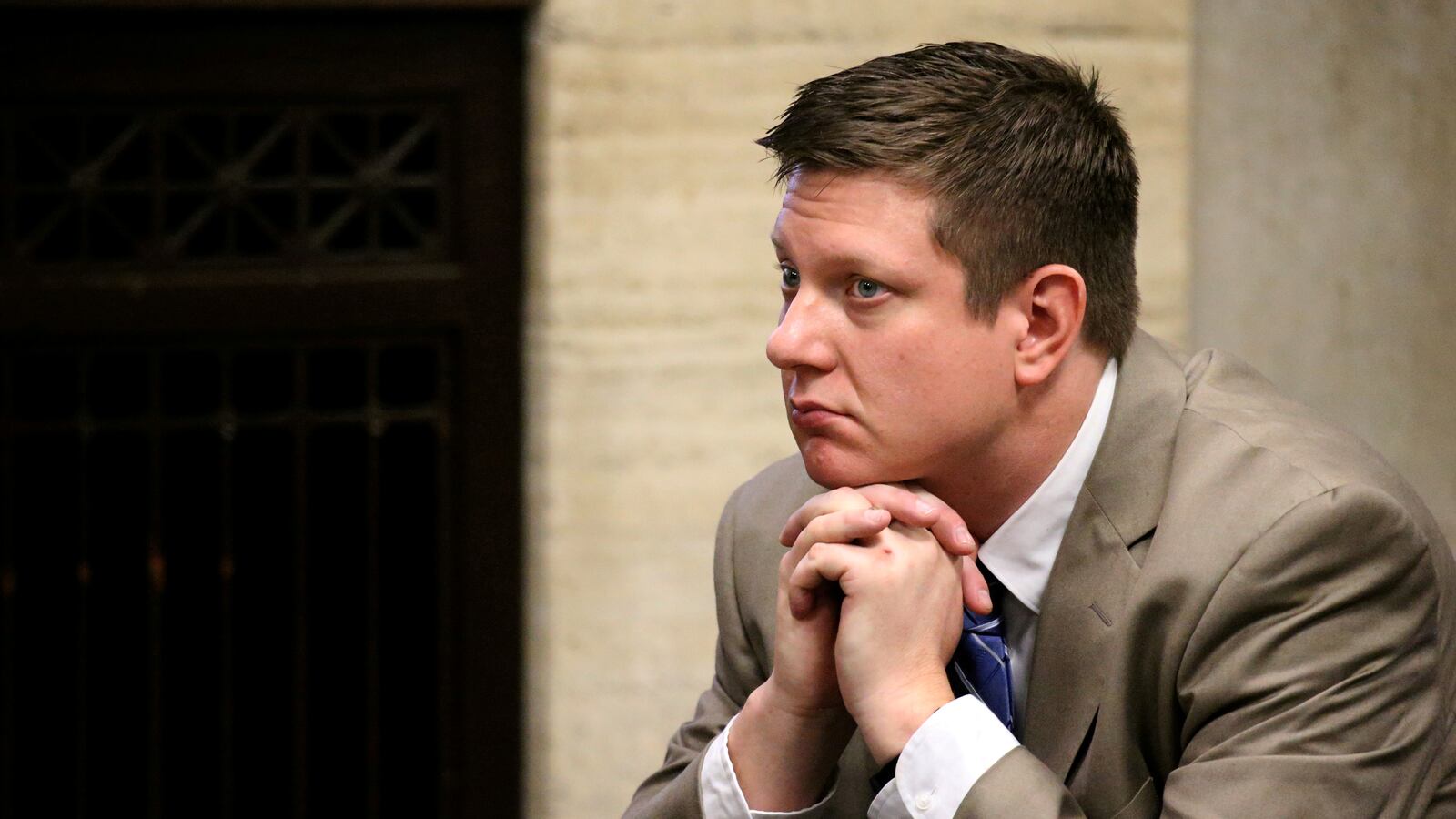When Chicago Police Officer Jason Van Dyke shot and killed black teenager Laquan McDonald in October 2014, it sent waves of anger across the city. A year later, protests raged for months after a video of the shooting was ordered released, and Van Dyke became the first Chicago police officer in decades charged with first-degree murder for an on-duty shooting.
Van Dyke has never talked to the media about his actions—until now, a week before his trial is slated to begin. In a tightly controlled interview with the Chicago Tribune, the police officer—whom McDonald’s family believe “assassinated” the 17-year-old—insists he’s not a racist, claims he prays for McDonald every day, and says he was simply “doing [his] job.”
Prosecutors say Van Dyke opened fire on McDonald six seconds after getting out of his squad car. The cop emptied his gun of 16 bullets within 15 seconds, and prosecutors say the teenager was lying mortally wounded on the ground for 13 of those 15 seconds. Van Dyke insists that he believed McDonald was attacking him with a knife when he fired.
“You don’t ever want to shoot your gun. It doesn’t matter if it’s to put down a stray animal or something like that. Nobody wants to shoot their gun,” said Van Dyke, who has been suspended since November 2015. “I never would have fired my gun if I didn’t think my life was in jeopardy or another citizen’s life was. It’s something you have to live with forever.”
Prosecutors say the video of the fatal encounter shows Van Dyke didn’t stop firing at McDonald until his partner told him to—because the teen was having trouble breathing and the three-inch blade was folded down into the knife’s handle.
Van Dyke appears to have used the Tribune interview as an attempt to challenge the image of him as a racist, trigger-happy cop who didn’t care about taking McDonald’s life. He says he was emotionally devastated following the shooting, offers up a rosary for McDonald’s family daily, and burst into tears when considering the prospect of a long prison sentence.
“Of course, I’m extremely nervous,” he said, contemplating his upcoming trial, due to start in the coming days. “I might be looking at the possibility of spending the rest of my life in prison for doing my job as I was trained as a Chicago police officer. Being away from family. Every day.”
The Chicago police officer insists that he’s the victim of a “bandwagon of hate” on social media and that the media portrayal of him is wrong. He added: “Anyone who knows me, knows me personally, knows... that I’m not a racist. That’s a great false narrative.... It’s just slander.”
However, McDonald’s family appears to be unconvinced by Van Dyke’s efforts to mend his reputation. His mother is reluctant to talk about her son’s death, but the teenager’s great-uncle questioned the sincerity of Van Dyke’s words and pointed out they were released just before trial.
“I don’t know the man,” the Rev. Marvin Hunter told the Chicago Tribune. “Is he really praying or is he just saying what he thinks you want to hear? They’re trying to write a narrative. They’re trying to influence the jury. I’m not mad or surprised because it’s just legal maneuvers. If I were writing the script for him, I would have him say exactly what he’s saying.”
When the trial begins next week, it will be up to a jury to decide whether Van Dyke’s 16 shots were justified. Three other Chicago police officers have already been indicted over the case—charged with conspiracy, official misconduct, and obstruction of justice, in an alleged attempt to cover up the shooting.
The video of the shooting—released by a judge despite a $5 million settlement with McDonald’s family that was meant to keep it confidential—appears to contradict a claim from Van Dyke that McDonald raised a knife across his chest and over his shoulder ahead of the shooting. Van Dyke’s attorney argues the video doesn’t show the officer’s vantage point.
“Obviously my darkest day was the night of the shooting,” said Van Dyke. “Just overwhelming amounts of everything at once: emotions, adrenaline...” he went on, before being stopped by his attorney.
But if Van Dyke is looking for understanding over his actions, it’s not coming from McDonald’s family. “It surprises me that he could say he is a good Catholic and stands on moral ground, but also said that he was justified and was in fear for his life,” said McDonald’s great-uncle.
He went on: “No one else drew their gun. The tape clearly shows this young man walking down the street. He wasn’t a threat to anyone.”






